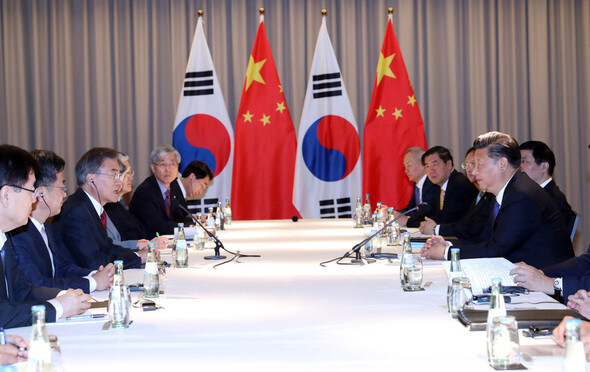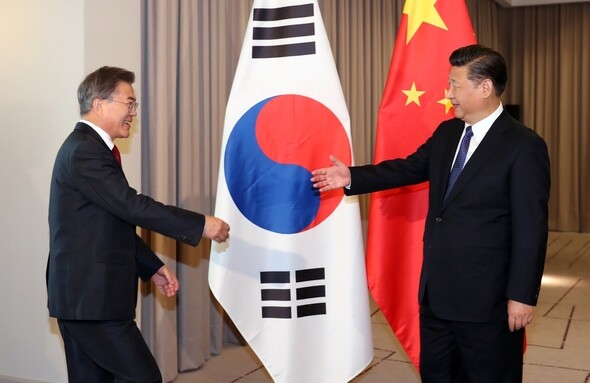hankyoreh
Links to other country sites 다른 나라 사이트 링크
[Editorial] South Korea-China summit signals hope amid challenging circumstances

President Moon Jae-in and Chinese President Xi Jinping held their first summit on July 6, which attracted particular attention because it took place amid serious friction over the deployment of THAAD on the Korean Peninsula and concerns over North Korea's development of nuclear weapons. Because it was a bilateral consultation that occurred in the context of a multinational conference, the G-20 Summit, it could have ended in a mere exchange of diplomatic formalities, but the unusual length of the summit, which lasted one hour and nineteen minutes, is an indication of just how serious the dialogue was. It is promising that, among the difficult issues to be dealt with, the two agreed that South Korea and China will cooperate on solving the problem of denuclearizing North Korea and on forming a strategic partnership for future progress. The meeting went well beyond diplomatic formalities, providing momentum toward strengthening cooperation between South Korea and China and easing tensions on the Korean Peninsula.
It appears that no clear progress was made on the issue of THAAD deployment, which is currently the biggest source of friction between the two countries. The Blue House frankly admitted that "on matters about which there are differences," opinions were exchanged openly at the meeting. Of course, "matters about which there are differences" is a reference to THAAD. Because THAAD deployment is a complicated issue involving not just South Korea and China but also the United States, it is not something that can be resolved in just one summit, yet it is significant that the two leaders were able to agree that they would not allow the problem to harm relations between our countries. President Moon's concern that THAAD might lead to reduced economic, cultural, and human exchanges with China is understandable. We shall have to watch closely to see if China will ease its various restrictions on South Korean businesses in the future.

A more important pending crisis is North Korea's development of nuclear weapons and ballistic missiles. Both President Moon and President Xi condemned the North's test launch of an ICBM as "unforgivable" and promised to work together toward a fundamental solution to the problems of the North's nuclear and missile programs. As is true of all such issues, it is important to go beyond merely taking a stance on principle and develop the specifics of practical, cooperative action. China should not just support South Korea's leading role in solving the problems of the Korean Peninsula but also needs to pressure North Korea to refrain from further nuclear tests. It is fortunate that the two leaders were able to build mutual trust in this first summit in spite of the dire external circumstances under which it took place.
Please direct questions or comments to [english@hani.co.kr]

Editorial・opinion
![[Column] Park Geun-hye déjà vu in Yoon Suk-yeol [Column] Park Geun-hye déjà vu in Yoon Suk-yeol](https://flexible.img.hani.co.kr/flexible/normal/500/300/imgdb/original/2024/0424/651713945113788.jpg) [Column] Park Geun-hye déjà vu in Yoon Suk-yeol
[Column] Park Geun-hye déjà vu in Yoon Suk-yeol![[Editorial] New weight of N. Korea’s nuclear threats makes dialogue all the more urgent [Editorial] New weight of N. Korea’s nuclear threats makes dialogue all the more urgent](https://flexible.img.hani.co.kr/flexible/normal/500/300/imgdb/original/2024/0424/7317139454662664.jpg) [Editorial] New weight of N. Korea’s nuclear threats makes dialogue all the more urgent
[Editorial] New weight of N. Korea’s nuclear threats makes dialogue all the more urgent- [Guest essay] The real reason Korea’s new right wants to dub Rhee a founding father
- [Column] ‘Choson’: Is it time we start referring to N. Korea in its own terms?
- [Editorial] Japan’s rewriting of history with Korea has gone too far
- [Column] The president’s questionable capacity for dialogue
- [Column] Are chaebol firms just pizza pies for families to divvy up as they please?
- [Column] Has Korea, too, crossed the Rubicon on China?
- [Correspondent’s column] In Japan’s alliance with US, echoes of its past alliances with UK
- [Editorial] Does Yoon think the Korean public is wrong?
Most viewed articles
- 1[Column] Park Geun-hye déjà vu in Yoon Suk-yeol
- 2Thursday to mark start of resignations by senior doctors amid standoff with government
- 3[Editorial] New weight of N. Korea’s nuclear threats makes dialogue all the more urgent
- 4Will NewJeans end up collateral damage in internal feud at K-pop juggernaut Hybe?
- 5Why Korea shouldn’t welcome Japan’s newly beefed up defense cooperation with US
- 6[Guest essay] The real reason Korea’s new right wants to dub Rhee a founding father
- 7Kim Jong-un expressed ‘satisfaction’ with nuclear counterstrike drill directed at South
- 8[Column] ‘Choson’: Is it time we start referring to N. Korea in its own terms?
- 9N. Korean hackers breached 10 defense contractors in South for months, police say
- 10[Column] Yoon’s first 100 days should open our eyes to pitfalls of presidential system